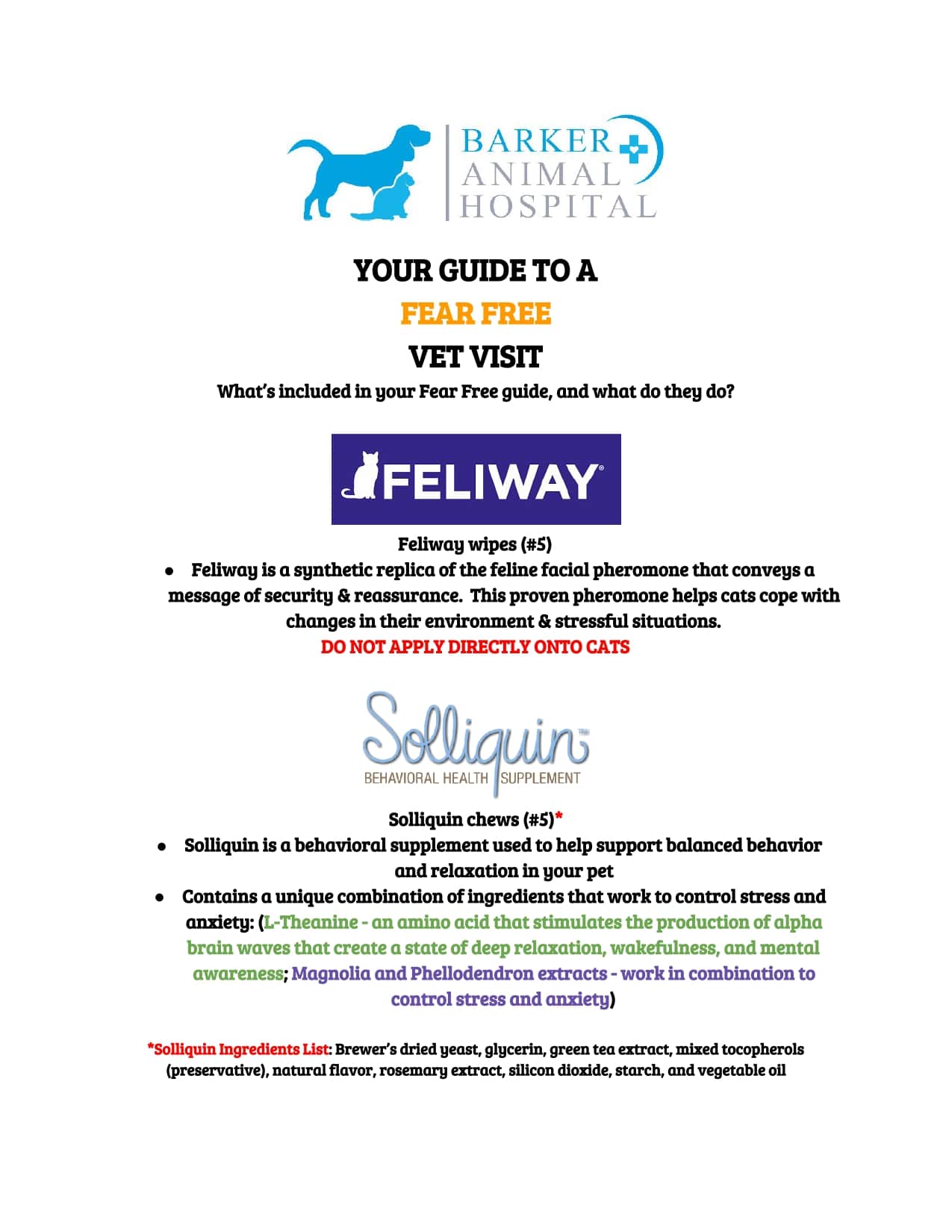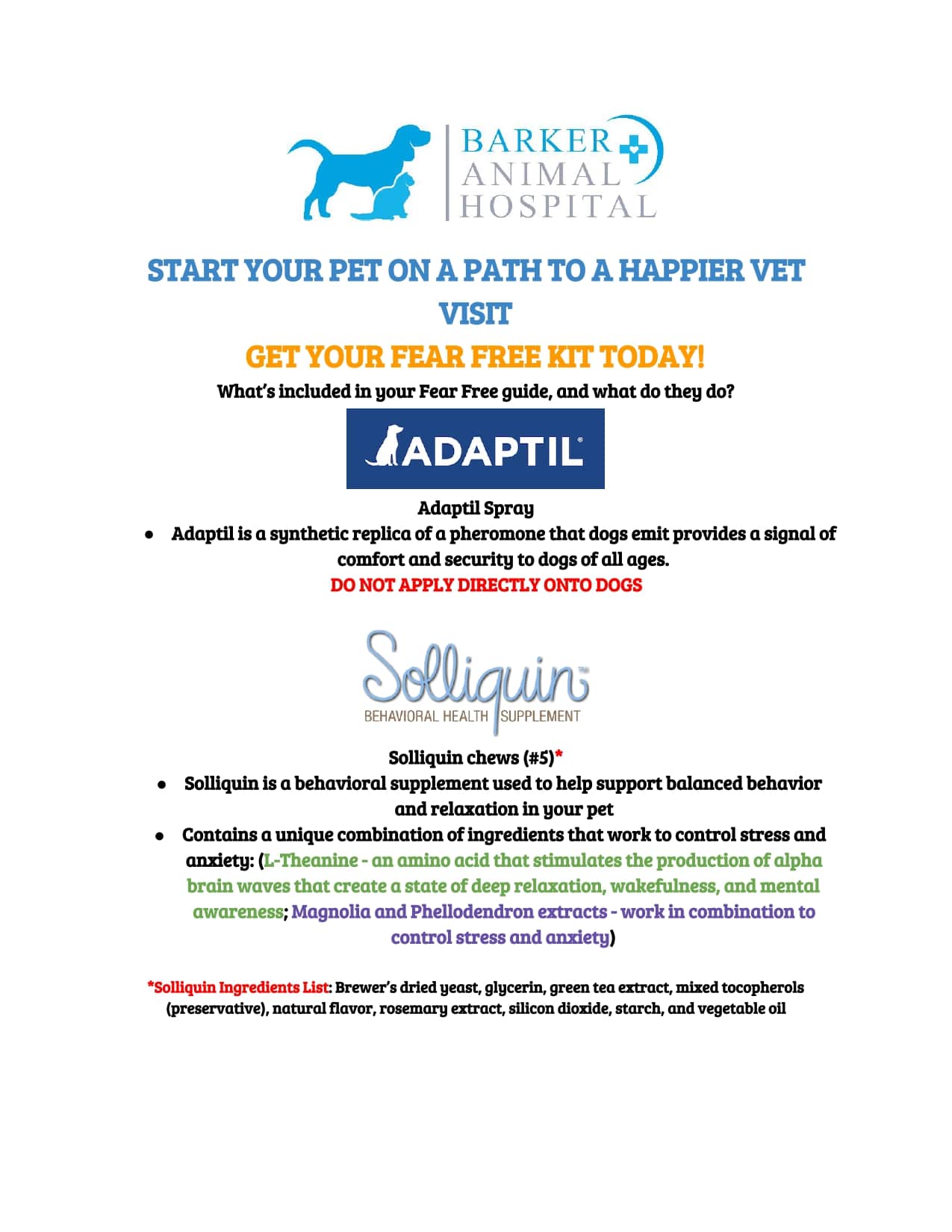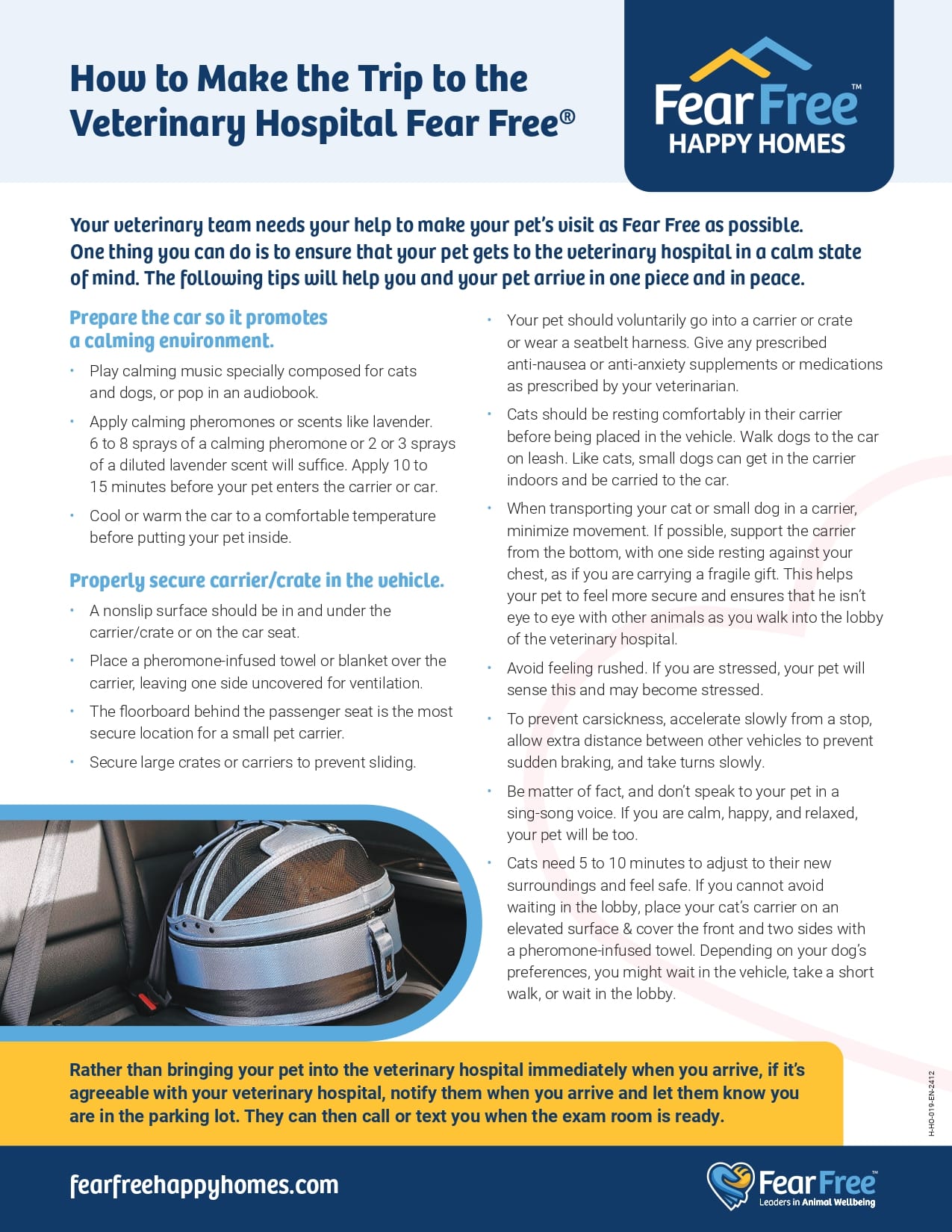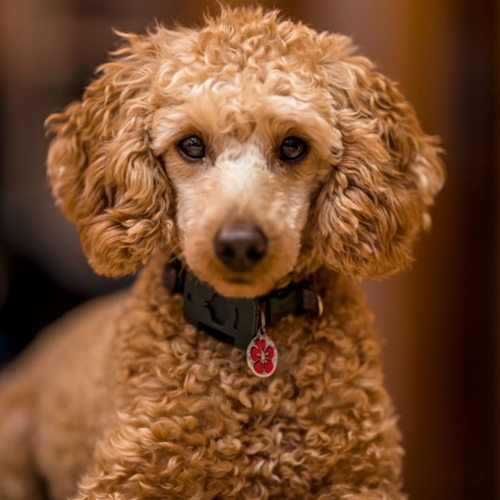Veterinarian Service
Pet Fear-Free
“Fear is the worst thing a social species can experience and it causes permanent damage to the brain” ~ Karen Overall, MA, VMD, Ph.D., DACVB, CAAB: World-Renowned Veterinary Behaviorist.

Pet Fear-Free
At Barker Animal Hospital, we don’t believe veterinary visits should ever be stressful events for any pet. Fear, anxiety, and stress can have significant health consequences for animals, which should be avoided. By working together, we can help lessen your best friend’s fear of veterinary care. The following are some of the methods we use to protect your pet’s emotional well-being:
Leaving the Pet in Control
Allow pets in carriers to come out on their own. Treats or toys can also be used to encourage pets to explore and become more comfortable in their new environment. We will attempt to perform any exams or procedures where your pet is most comfortable (table, floor, lap, etc.). If your pet becomes reactive and cannot be calmed, we may recommend rescheduling the appointment and using a prescribed sedative.
Setting the Mood
Our staff members speak using soft voices in the room and work hard to proactively keep noise to a minimum. We invite you to do the same (including silencing phones) to help your pet remain calm. We frequently play gentle music that has been shown to have a calming effect on pets.
Pre-Visit Pharmaceuticals
When medically appropriate, our veterinarians may prescribe medications that help to take the edge off your pet’s anxiety and make them feel more relaxed. Learn more about pre-visit pharmaceuticals here.
Treats
Unless inappropriate for your companion’s health, we have a variety of treats to reinforce positive experiences, help your pet associate the hospital with a fun event and hopefully reset his or her state of mind. Avoid giving the same treats at home to make the veterinary visit more rewarding for your pet.
Fear Free
Join the Fear Free revelation and register for your FREE account today. Get access to hundreds of articles and videos to help you with training your pet, tips for a happier vet visit, and much more!
Pheromones
To help pets feel safe and calm, we defuse species-specific ‘chemical signals,’ which only dogs or cats detect, in our lobby and exam rooms. We also apply pheromones to ourselves and our equipment. These are also available for purchase to use at home and while traveling.
Our Fear Free Visit Kit includes Feliway wipes for cats (to be used on carrier/car surfaces) and a sample of Adaptil spray for dogs, which can be applied to a bandana and tied around a pet’s neck or sprayed onto clothing/car surfaces.
Adaptil®: This synthetic pheromone, which mother dogs emit to help their puppies feel safe and reassured, is effective for dogs of all ages.
Feliway®: The feline facial pheromone that cats use to mark safe areas.
Fear-free veterinary visits begin at home long before the appointment.
These are some tools and tactics you can use at home to help prepare your pet for a trip to the veterinarian with far less fear, anxiety, and stress:
Environment
Calm music (especially gentle classical music) can help keep your pet calm at home before the appointment and during the car ride. Included in our Fear Free Visit Kits is a species-specific CD of calming music to play on your car ride here. Bringing a favorite toy or blanket that smells like home can also help to keep your pet relaxed.
Calming Products
Thundershirt: A calming body wrap for dogs — like a warm hug.
Solliquin: A supplement that promotes normal behavior and facilitates a calming effect without sedation. A size and species-appropriate dose are included in our Fear Free Visit Kit as well.
Pre-Visit Pharmaceuticals
When medically appropriate, the doctor may prescribe medications that are to be administered at home before the appointment to keep your pet calm.
Hunger
When possible and appropriate, bringing your pet in hungry can reduce carsickness and make him or her more eager to earn treats during the exam. This reinforces a positive experience.
Carriers
Choose carriers with hard outer shells that can easily open from the top and front.
Bring the carrier out a few days before the visit (or even better, keep it out all the time) so your pet becomes more familiar and comfortable with it.
Training
Positive, gentle, reward-based training can help your pet remain calm in many settings. To keep your companion occupied, calm, and happy, direct him or her to perform favorite tricks or commands while waiting for the doctor.
Play Doctor
Touch: Mimic the doctor’s exam – play with feet, look in and touch the mouth, lift the tail, etc. Soon the doctor’s routine will seem much less frightening.
Tools: For example, ask for a plastic syringe to take home. When your pet is comfortable with it, pull up a little skin as if to give it a shot, then poke gently with the plastic – go slowly and use plenty of treats until the syringe is no longer scary.
Routine Considerations
Vary your routine. Pets that have already had a traumatic experience at the vet will be cautious of anything that might indicate the threat of another trip there. For example, if you only bring out your pet’s carrier when it is time to go to the doctor, your pet may experience fear and anxiety every time it sees the carrier.
Vary your path. Using a different entrance, hallway, and/or room can reduce the triggering of past fearful emotions. Ask our team if you would like help with this.
Transportation Considerations
Car rides can be less traumatic if you help your pet ease into them. Over time, progress through the following stages:
- Sit with your pet in the car while off
- Start the car
- Take short trips
- Take longer trips (including just-for-fun visits to the doctor)
Car Sickness: If your pet experiences carsickness, this can add to the discomfort and stress of their visit. Our doctors can prescribe effective and safe nausea medication to give your pet prior to travel. This will help alleviate any nausea they experience as well as allow for positive reinforcement with treats during their visit.
Carrier: Place the carrier on a steady, level surface (on the floor, behind the passenger seat is safest) and always carry carefully, using both hands.
Timing: Leave early for appointments. Pets will be more relaxed when you are less stressed, and you will be less likely to need to brake suddenly.
Noise: Soft music, especially classical, played in the car will help everyone remain calm. Talking to your pet along the way is also reassuring – use a soft, low voice (not baby talk).
Veterinary Services
Below are all of the veterinary services we offer at Barker Animal Hospital. If you have any questions regarding our services, please feel free to call us.




